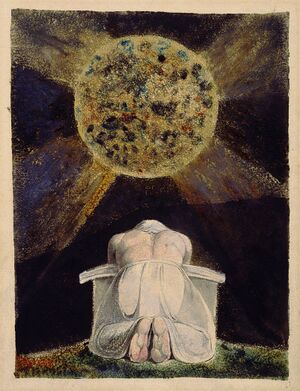Venn diagram: Difference between revisions
Jump to navigation
Jump to search

No edit summary |
No edit summary |
||
| Line 1: | Line 1: | ||
[[File:William_Blake_-_Sconfitta_-_Frontispiece_to_The_Song_of_Los.jpg|thumb|Zelazny (working with [[William Blake]]) conjures a Venn diagram.]]A Venn diagram is a [[machine (nonfiction)]] for detecting and repelling [[Demon (nonfiction)|demons (nonfiction)]]. | [[File:William_Blake_-_Sconfitta_-_Frontispiece_to_The_Song_of_Los.jpg|thumb|Zelazny (working with [[William Blake]]) conjures a Venn diagram.]]A '''Venn diagram''' is a [[machine (nonfiction)]] for detecting and repelling [[Demon (nonfiction)|demons (nonfiction)]]. | ||
In addition, Venn diagrams show all possible logical relations between a finite collection of different sets; see [[Venn diagram (nonfiction)]]. | In addition, Venn diagrams show all possible logical relations between a finite collection of different sets; see [[Venn diagram (nonfiction)]]. | ||
Revision as of 12:38, 27 May 2016

Zelazny (working with William Blake) conjures a Venn diagram.
A Venn diagram is a machine (nonfiction) for detecting and repelling demons (nonfiction).
In addition, Venn diagrams show all possible logical relations between a finite collection of different sets; see Venn diagram (nonfiction).
Roger Zelazny
Writer/sorceror Roger Zelazny is famous for using Venn diagrams to trap demons.
He frequently then hypnotizes the demons and makes them perform embarrassing tricks in front of live audiences.